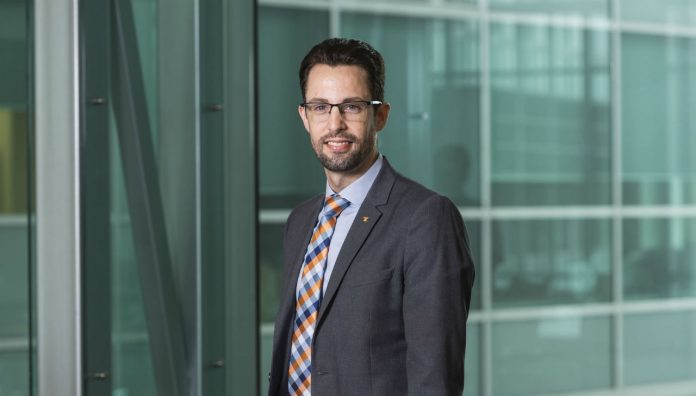The new President of the Pharmaceutical Society of Australia (PSA) is Dr Chris Freeman – currently Clinical Senior Lecturer and the Director of the Centre for Optimising Pharmacy Practice-based Excellence in Research (COPPER) at the University of Queensland and Consultant Practice Pharmacist at Camp Hill Healthcare in Brisbane.
Chris’ professional contribution began in 2009 when he joined the PSA’s Early Career Pharmacist working group of the Queensland Branch – he was elected Chair soon after. By 2016 he had been elected National Vice President of PSA with significant contributions to the policy, advocacy and innovation at the organisation. His full biography is available here.
Australian Pharmacist sat down for a chat soon after his appointment.
AP: Congratulations on your new role, Chris. What can you say about those shoes you’re stepping into?
CF: It’s been an absolute honour to serve as Shane Jackson’s Vice President. I’ve not come across anyone who has invested his level of energy, enthusiasm and commitment – not only to the PSA but to the profession more widely. He has been a passionate advocate for moving the profession forward on a very positive pathway, and he’s certainly set the platform for me. I hope I’m able to continue his great work.
AP: The trajectory of your career path seems to have been aimed towards this kind of leadership role.
CF: An opportunity came up to join the PSA Queensland Branch’s ECP working group and I thought I had something to offer. I felt compelled to try and do something about the issues that pharmacists were facing, rather than sitting on the sidelines. Over time, I found that I also wanted to contribute to the governance of the PSA given my interest in policy and innovation. I love my profession and want to see pharmacists respected and rewarded for the integral role we have in the health system. This continues to drive me today and stepping into the Presidency of the PSA provides me with an opportunity to do just that.
AP: Do you still plan to maintain your role as a consultant pharmacist in a general practice setting?
CF: Yes, the body of work that I’ve been focused on recently has been trying to further develop collaborative practice models and the evidence to support those practice models. I’ve tried to do that by example, not just within my own research work, but also in my own clinical practice. I plan to maintain my clinical activity moving forward – I think it provides a great touchpoint with consumers and a grounding so that I can have an understanding of the things that are going on within the profession. And it’s an absolute pleasure to work alongside GPs and other allied health professionals who genuinely believe in interdisciplinary care, where they see a genuine role for pharmacists and community pharmacy in the care of patients.
AP: That is a big part of the PSA’s vision for the profession, and will be headlined in the Pharmacists In 2023 launch in March. How would you summarise that vision for the future of pharmacy in Australia?
CF: I want to see pharmacists practising to their full scope, filling genuine patient need, and this drives everything that we’ve done from the PSA point of view. The underlying philosophy is that whenever or wherever a medicine is being used or considered, a pharmacist should be involved to ensure the quality use of that medicine is being considered. This ensures that pharmacists are regarded by consumers, the public, by government and other health professionals as integral members of the healthcare team. Sometimes pharmacists are seen as nice to have but not a necessity. Pharmacists In 2023 will provide the platform from which we can say we are a necessity in the healthcare team. Patient outcomes are improved if pharmacists are provided with opportunities to meaningfully engage with their care and we can do this by delivering that care to our full scope of practice. Pharmacists In 2023 provides the action items – not only for the PSA, but for the profession more widely, to achieve that goal.
AP: What are the impediments to achieving these goals?
CF: We have to facilitate pharmacists to practise to the best of their ability, and that’s done through professional support and tools led by professional organisations such as the PSA. It’s through setting standards and enabling quality of practice. It’s also ensuring that we’ve got the right funding framework to allow pharmacists to meaningfully engage in a model of practice where patients are going to get the most out of the pharmacist’s care. And that might include things like external funding from Primary Health Networks, the Medicare Benefits Schedule (MBS) or it might be related to how the Community Pharmacy Agreement is structured.
AP: A bit about yourself. How do you achieve work/life balance?
CF: I’ve got a really young family – a six and a four-year-old. So a lot of my spare time is focused on the children and their activities. I love spending time at home here in Brisbane with them and my wife, and I try to make the most out of that. I’ve tried to manoeuvre things around my clinical practice as well as my practice at the university to really allow me to still dedicate genuine family time.
AP: And if you have any time to yourself?
CF: Exercise is my release. When I do get a bit of spare time I’m either out at the gym or on the bike. It gives me some thinking time, too, and is really important for maintaining the energy levels. I’m really focused on trying to maintain that energy in my role as President of the PSA.



 Professor Margie Danchin[/caption]
Professor Margie Danchin[/caption]

 Dr Peter Tenni[/caption]
Dr Peter Tenni[/caption]
 How should we deprescribe gabapentinoids, according to the Maudsley Deprescribing Guidelines[/caption]
How should we deprescribe gabapentinoids, according to the Maudsley Deprescribing Guidelines[/caption]



 Pharmacists have always prescribed, but they have the potential to prescribe much more
Pharmacists have always prescribed, but they have the potential to prescribe much more






